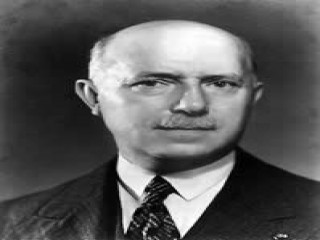
Albert Caquot biography
Date of birth : 1881-07-01
Date of death : 1976-11-28
Birthplace : Vouziers, Ardennes
Nationality : French
Category : Arhitecture and Engineering
Last modified : 2011-07-01
Credited as : Engineer, and inventor,
3 votes so far
Albert Caquot conducted outstanding research that was immediately applied in construction. His major contributions include:
- reinforced concrete design, and structural engineering in a broader sense. In 1930, he defined the intrinsic curve and explained why the elasticity theory was not sufficient any more for modern structures design.
- geotechnics and foundation design. He stated the corresponding states theorem (CST). In 1933, his publication on the stability of pulverulent and coherent material received an admiring report from the French Academy of Sciences, where he was elected life member in 1934. In 1948, with Jean Kérisel (1908–2005), his son-in-law and disciple, he developed an advanced theory extremely important for passive earth pressure (LINK) where there is soil-wall friction. This principle has been broadly applied ever since for the design of ground engineering structures such as retaining walls, tunnels and foundation piles.
- the revival of cable-stayed bridges with reinforced concrete (Donzère Mondragon bridge, 1952), which he envisioned with long spans, even crossing the English Channel. In 1967, he designed a conceptual double-deck bridge of this type with 810 m-wide spans and two 25 m-wide decks stages accommodating 8 lanes for cars, 2 for rail and 2 for skytrain.
Designer
Caille Bridge (1928)
Donzère-Mondragon Bridge (1952)
Donzère-Mondragon Canal Bridge (1950)
Girotte Dam (1948)
Groléjac Bridge (1932)
Le Sautet Bridge (1928)
Le Sautet Dam (1935)
Ponsonnas Bridge (1941)
Pont de la Jonelière (1948)
Pont du Fleix (1928)
Pont Jacques-Boulloche (1953)
Roche-Posay Bridge (1937)
Saint-Just-Saint-Rambert Bridge (1930)
Viaduc de Waville (1932)
Engineer
Barrage de Vezins (1932)
La Roche-qui-Boit Dam (1919)
Pont Lafayette (1928)
















